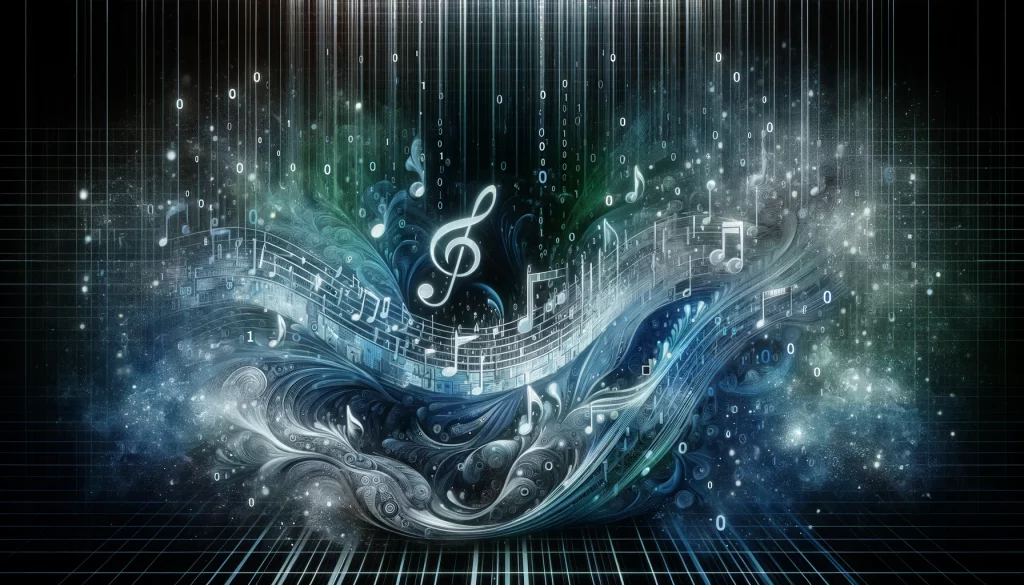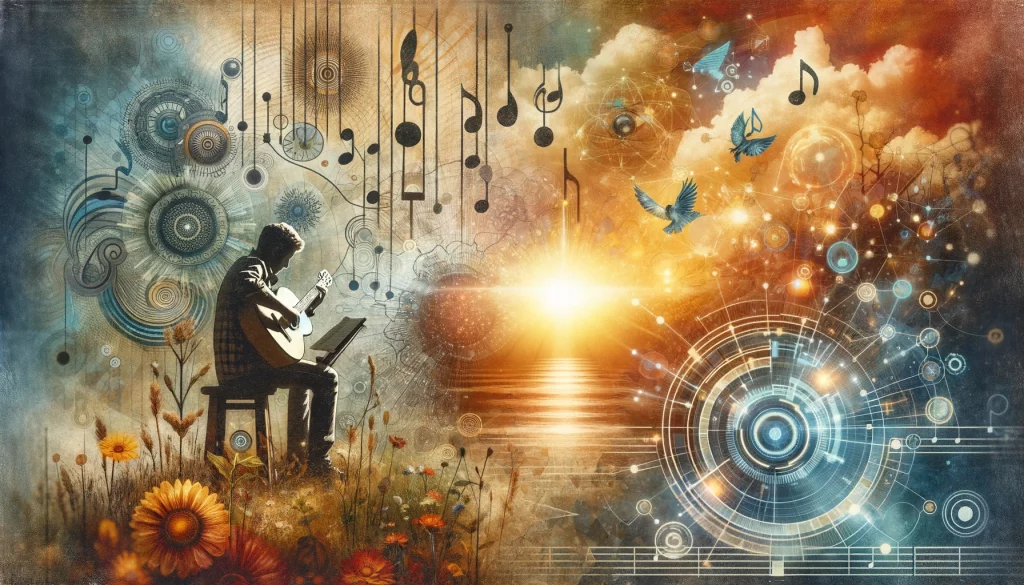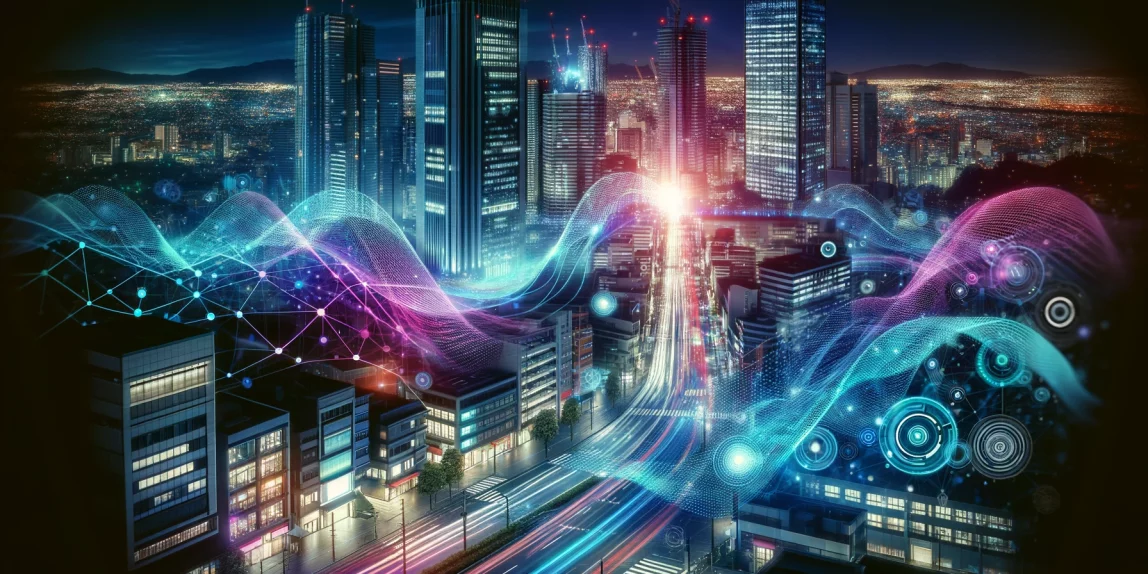As we stand on the brink of a new era, the fusion of artificial intelligence (AI) with the music industry promises to usher in a revolution unlike any we’ve seen before. From the way music is created to how it’s marketed, AI’s potential to transform the landscape is boundless. Let’s explore, through an educated lens, the theoretical yet plausible future of music intertwined with AI.
Music Creation and Production
AI-Driven Composition
- The Rise of AI Composers: Imagine a world where AI algorithms can compose music that resonates with the human soul, crafting melodies that evoke deep emotions. This isn’t far-fetched. AI composers could analyze vast datasets of music to generate compositions in any genre, potentially leading to the birth of entirely new genres.
Enhanced Sound Design
- AI as Sound Designers: The future may see AI not just as a tool but as a collaborator in sound design. By understanding the nuances of sound textures, AI could suggest or automatically apply enhancements to create richer, more immersive audio experiences.
Personalized Music Production
- Tailored Music Experiences: AI could customize music production to suit the listener’s mood, setting, or preferences in real-time, offering a unique, personalized listening experience for each individual.
Songwriting and Lyrics
Collaborative Songwriting
- AI as a Co-Writer: Songwriters might partner with AI to overcome creative blocks, with AI suggesting lyrics or melodies based on the songwriter’s style or the current emotional tone of the song.
Emotional and Cultural Resonance
- Deep Emotional Insights: AI could analyze social media trends and global events to guide songwriters on themes that might resonate more deeply with audiences, leading to lyrics that are timely and culturally relevant.
Organization and Workflow Optimization
The integration of AI into organizational and workflow aspects of the music industry could redefine efficiency and creativity, allowing artists, producers, and labels to focus more on the art of music. Here’s a closer look at how AI can streamline these processes:
Streamlined Music Production
- Efficiency in the Studio: AI’s capability to manage logistical aspects of music production can drastically reduce the time spent on non-creative tasks. From scheduling studio time to managing file storage and sharing, AI can automate routine tasks, ensuring that artists and producers can dedicate more energy to the creative process.
- Workflow Optimization: By analyzing past projects, AI can suggest optimal workflows for different types of music production, potentially identifying bottlenecks or inefficiencies in the current processes. This could lead to more streamlined production timelines, reducing costs and enabling faster release cycles.
- Collaboration Facilitation: AI can also play a pivotal role in facilitating collaboration among artists, musicians, and producers, even when they are in different parts of the world. By intelligently managing file versions, feedback loops, and communication, AI can ensure that collaborative projects progress smoothly without the usual logistical hiccups.
AI-Assisted Performance Analysis
- Real-Time Feedback for Live Performances: Leveraging AI for real-time performance feedback can be a game-changer for live shows. AI systems equipped with machine learning algorithms could analyze audience reactions, sound quality, and even the performance energy, providing artists with actionable insights during or immediately after their performance. This could help artists adjust their setlists, performance style, or stage presence to better engage with their audience.
- Post-Performance Analysis: Beyond real-time feedback, AI can offer detailed post-performance analysis, identifying which songs resonated most with the audience, the dynamics of audience engagement throughout the show, and areas for improvement. This data can be invaluable for artists looking to refine their live performances or tailor their shows to different demographics or regions.
- Enhancing Studio Recording Sessions: In the studio, AI can analyze takes in real-time, suggesting adjustments to microphone placement, EQ settings, or performance nuances to capture the best possible sound. This can significantly speed up the recording process and improve the final product’s quality.
Advanced Project Management
- Automated Task Allocation and Scheduling: For larger projects involving multiple stakeholders, AI can automate task allocation based on each team member’s skills, availability, and past performance. It can also dynamically adjust project timelines in response to delays or early completions, ensuring that the project stays on track.
- Budget Management: AI can also assist in managing budgets for music projects, tracking expenditures in real-time, and forecasting future costs based on historical data. This can help artists and producers make informed decisions about where to allocate resources for maximum impact.
By harnessing AI in these ways, the music industry can not only achieve greater efficiency and creativity in production but also foster a more collaborative and innovative environment. As we continue to explore the boundaries of what AI can offer, the potential for transformative change in how music is made and performed is limitless.

Marketing and Distribution
The advent of AI in the marketing and distribution of music is set to revolutionize how artists connect with their audience and how music finds its way to listeners worldwide. Here’s a more in-depth exploration of the potential impacts:
Predictive Analytics for Marketing
- Data-Driven Strategies: Utilizing AI for predictive analytics allows artists and labels to understand listener preferences and behaviors at an unprecedented level. By analyzing streaming data, social media interactions, and even global music trends, AI can help predict which songs are likely to become hits, the best release times, and which markets to target.
- Enhanced Fan Engagement: AI can analyze individual listener data to help artists create more engaging and personalized experiences. Whether through tailored social media content, personalized emails, or even AI-generated music recommendations, artists can build deeper relationships with their fans.
- Optimization of Ad Spending: By leveraging AI to analyze the effectiveness of different marketing channels in real-time, music marketers can optimize their ad spending to ensure the highest possible ROI. AI algorithms can dynamically allocate budgets across social media, search engines, and other digital platforms, focusing on those delivering the best results.
Hyper-Personalized Recommendations
- Customized Listener Journeys: The power of AI to curate hyper-personalized playlists for listeners on streaming platforms is unparalleled. By analyzing past listening habits, AI can predict what a listener might enjoy next, introducing them to new artists or songs they are likely to love but haven’t discovered yet.
- Dynamic Music Discovery Features: Beyond personalized playlists, AI can drive innovative music discovery features such as mood-based recommendations, situational playlists (e.g., for working out or relaxing), and even recommendations based on the time of day or weather.
- Creating Emotional Connections: AI’s ability to understand the emotional content of music can lead to recommendations that connect with listeners on a deeper level, fostering a more meaningful connection between the artist and the listener.
Streamlined Distribution Channels
- Automated Distribution: AI can automate many aspects of music distribution, ensuring that new releases are efficiently uploaded to all major platforms simultaneously. This can significantly reduce the time and effort required to manage releases, allowing artists to focus more on their creative work.
- Smart Contracts for Rights Management: Utilizing blockchain technology, AI can help manage music rights and royalties more efficiently. Smart contracts can automatically execute agreements between artists, labels, and distribution platforms, ensuring fair and timely payments.
- Global Market Penetration: AI can identify emerging markets and untapped audiences for artists, suggesting targeted distribution strategies that can expand an artist’s global reach. By analyzing music consumption patterns across different regions, AI can provide insights into where an artist’s music might resonate the most.
The integration of AI into marketing and distribution represents a paradigm shift in how music reaches audiences and how artists connect with their fans. By leveraging data in new and innovative ways, AI can help artists not only reach a wider audience but also create more personalized and meaningful connections with their listeners
Theoretical Innovations on the Horizon
Virtual Reality Concerts
- Immersive VR Experiences: AI could drive the development of virtual reality concerts, offering fans around the world front-row seats to live performances in stunningly realistic virtual environments.
AI-Generated Visuals
- Music Videos and Artwork: AI might create dynamic music videos or album artwork that changes based on the music’s mood, tempo, or even listener reactions, offering a new dimension to the visual aspects of music.

Conclusion
Embracing the Future Together
As we journey through the myriad ways in which artificial intelligence is set to revolutionize the music industry, it’s evident that we are on the cusp of a transformative era. This evolution is not just about the technological shifts in creation, marketing, and distribution but about discovering new realms of creativity and human connection.
The Fusion of AI and Creativity
The integration of AI into the fabric of music creation and distribution is a present reality, evolving daily. For us musicians, this represents an extension of our creative toolkit, akin to the evolution from acoustic to electric, from analog to digital. AI stands as a beacon of innovation, offering new dimensions of expression and storytelling.
Augmenting Human Creativity
Embracing AI doesn’t imply a loss of the human element that music so deeply requires; rather, it’s about augmenting our creativity and enhancing our ability to connect. Imagine the potential to craft more resonant compositions, reach global audiences effortlessly, and explore musical creation in ways yet to be imagined. AI in music promises a future of deeper emotional engagement, limitless creative exploration, and a more inclusive musical world.
A Call to Innovate
To my fellow creators, I urge you to approach AI with curiosity and openness. Dive into the potential of these tools, explore their capabilities, and envision how they might elevate your art. The future of music will not solely be shaped by technology but by how we harness it to realize our artistic visions.
Shaping Our Musical Legacy
Let’s step into this new frontier with the spirit of discovery that has always propelled music forward. By merging technology with our innate creativity, we can unlock unprecedented avenues for artistic expression and cultural connection. Together, we have the power to define the next chapter in the story of music, one where technology and artistry converge to create a legacy of innovation and inspiration.
